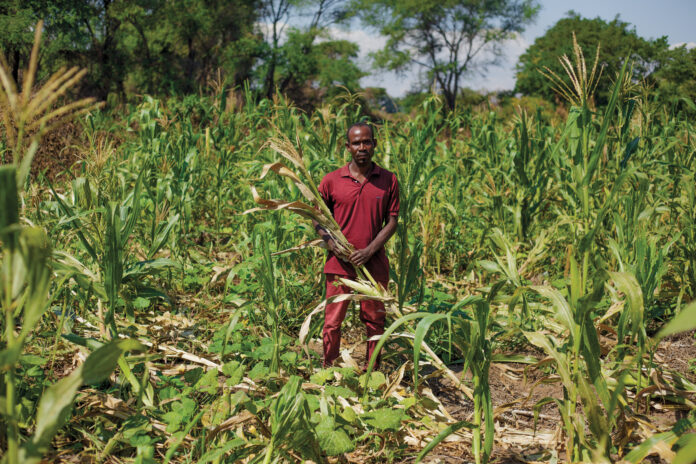In the far-flung fields of Mambwe District, over sixty farmers who once found hope in irrigation farming now watch in despair as elephants allegedly crossing over from Malawi trample and feast on their crops, turning their dreams into dust.
On March 1, 2024, President Hakainde Hichilema declared the drought a national disaster and urged citizens to adopt irrigation farming.
In response to the President’s call, many people in Mambwe District turned to irrigation after the rainy season ended this year, with most replanting maize in a bid to secure their food supply.
Mambwe district is one of the districts in Zambia where many people barely depend on farming to survive.
For them, this is not a matter of laziness or land shortage but an enduring battle between humans and wildlife, a struggle that has persisted over time and driven many deeper into poverty.
Before the area was declared a Game Management Area (GMA), many especially men depended on hunting, trading game meat for maize with people from far-off areas.
It was from these hunting activities that the area is also called “Malambo constituency” a name derived from the Kunda words “Mala” meaning intestine and “Mbo” meaning buffalo a reference to buffalo intestines that were once exchanged for maize and millet.
However, when the area was designated a GMA in 1972, locals were encouraged to abandon hunting and embrace farming, with promises that conserving wildlife could lead to greater economic benefits through tourism.
While some resisted the transition, many eventually took up farming under the agreement that the government would protect their crops from wild animals.
But when the severe drought of 2024 struck, it left nearly everyone in Mambwe without enough food, reigniting fears of food insecurity.
Learning from the experience, a significant number of residents embraced irrigation farming this year because many did not have a sufficient harvest again in the 2024–2025 rainy season.
However, an unexpected tragedy has discouraged them, as elephants have continued to eat the maize and destroy other crops in the fields.
In an effort to address the crisis, the government, with support from local lodges, is distributing fireworks and whistles for farmers to use in scaring the animals away.
However, George Njobvu, one of the affected farmers, criticized these measures as ineffective and dangerous, especially when the elephants become aggressive.
“We need things like solar fences around our fields; with those, the chances of elephants invading or harming people would be lower because if we hunt them, we risk being imprisoned,” said Mr. Njobvu.
Other farmers have also expressed frustration at what they see as the government’s failure to honor its commitment to protect them from animal invasions.
John Mwale, who invested in a water pump for irrigation this year, lamented the sleepless nights spent guarding his fields, saying every elephant raid results in heavy crop losses.
“We thought the government would be responsible for chasing elephants, but instead, they gave us fireworks to do it ourselves a method that is putting many lives at risk,” Mr. Mwale said.
He also suggested that, rather than fireworks, the government should provide solar fences or at the very least, make them available locally.
Meanwhile, some staff from the Rapid Response Unit (RRU), who requested anonymity, stated that solar fences can only be considered if farmers start sleeping near their fields.
For the people of Mambwe, the tears shed in the silence of the night speak volumes about their frustration, as they wait still hopeful for the lasting solution they were promised.

